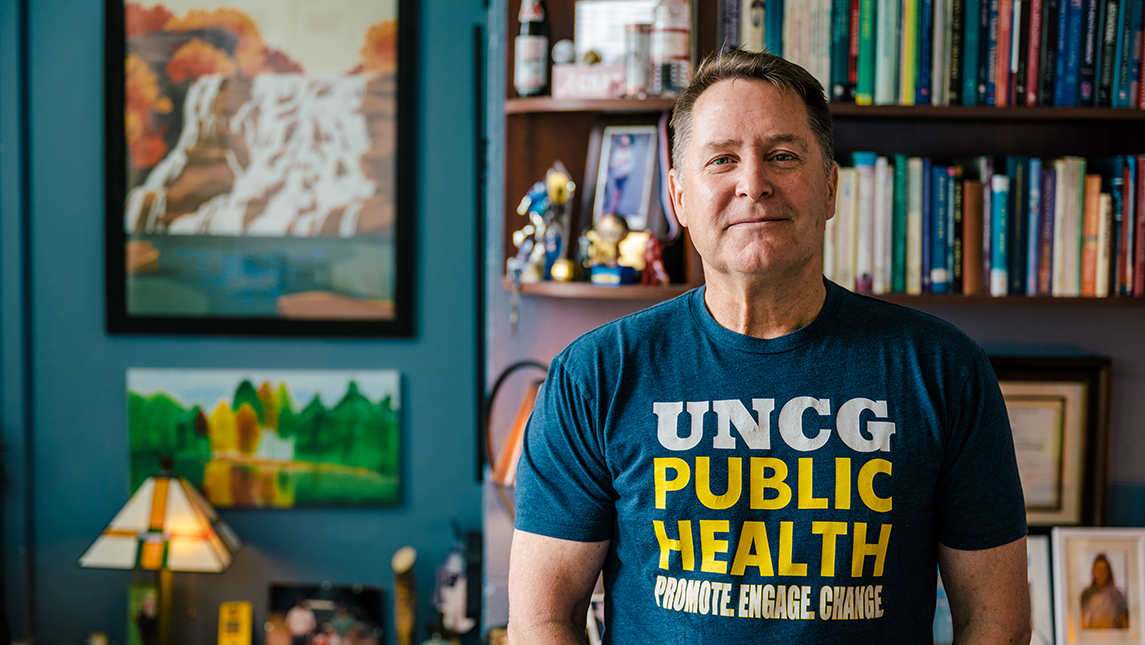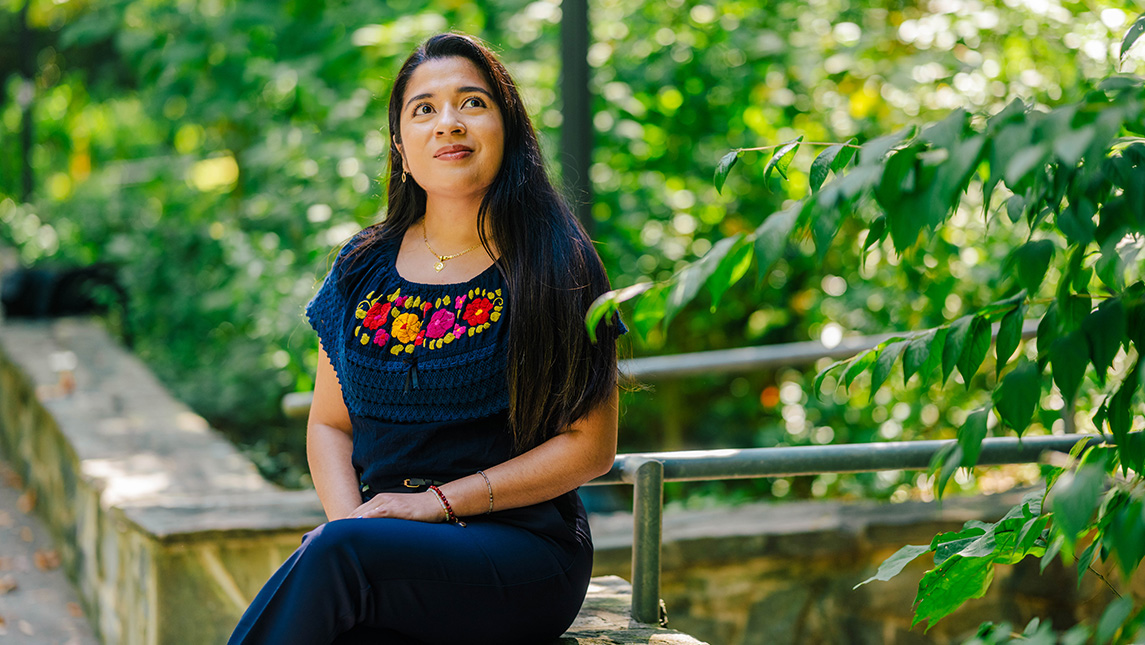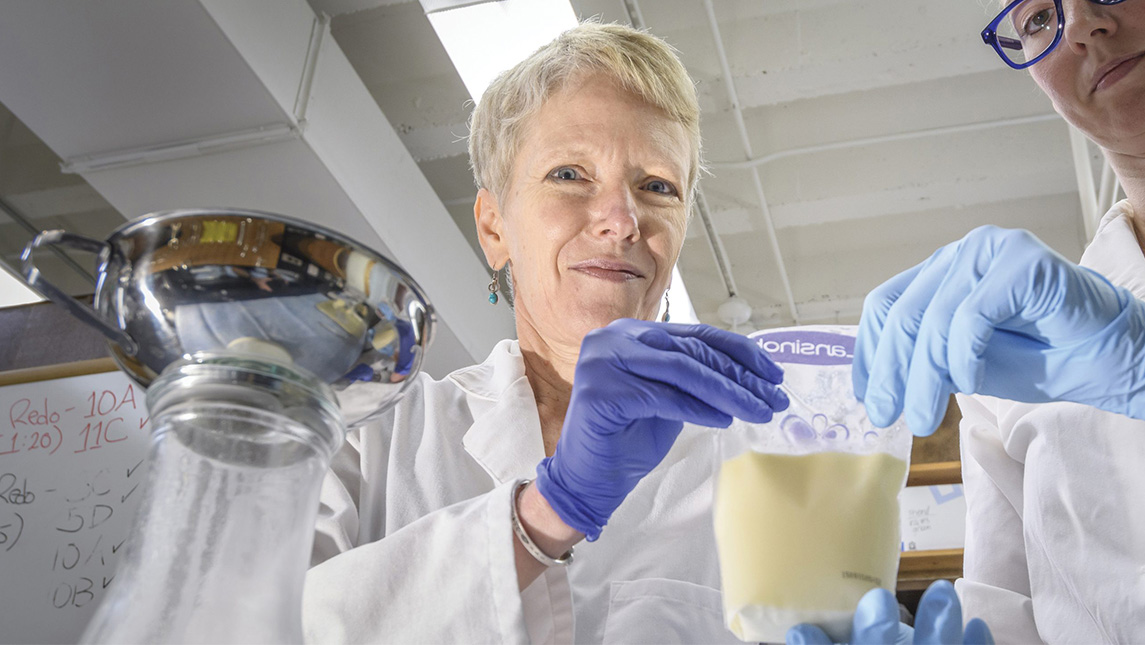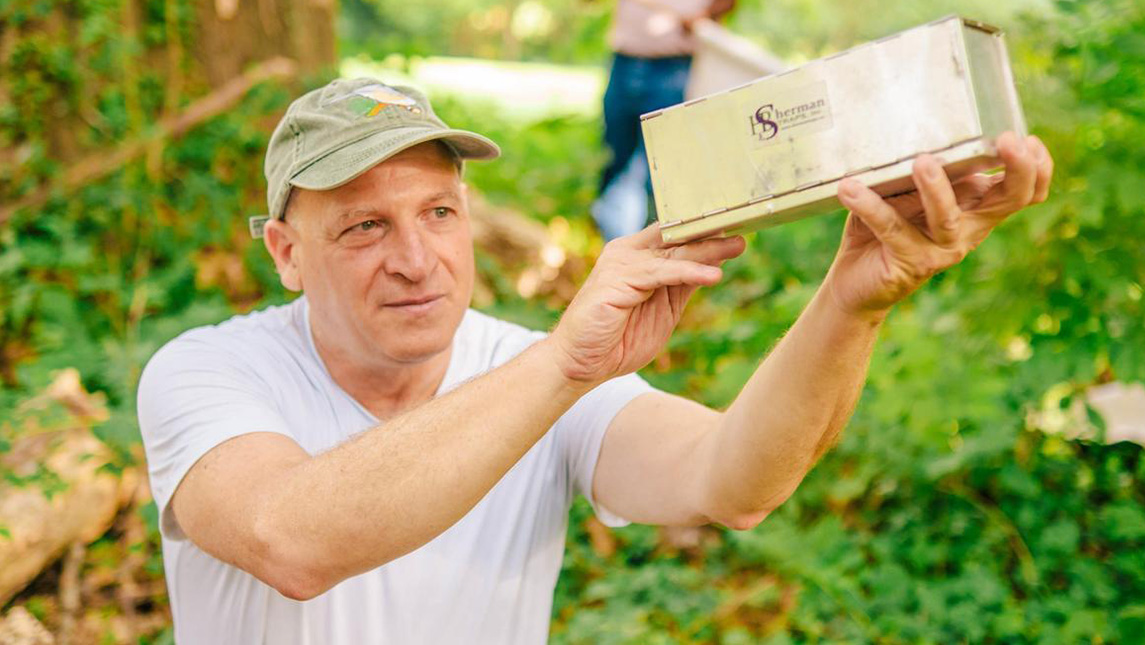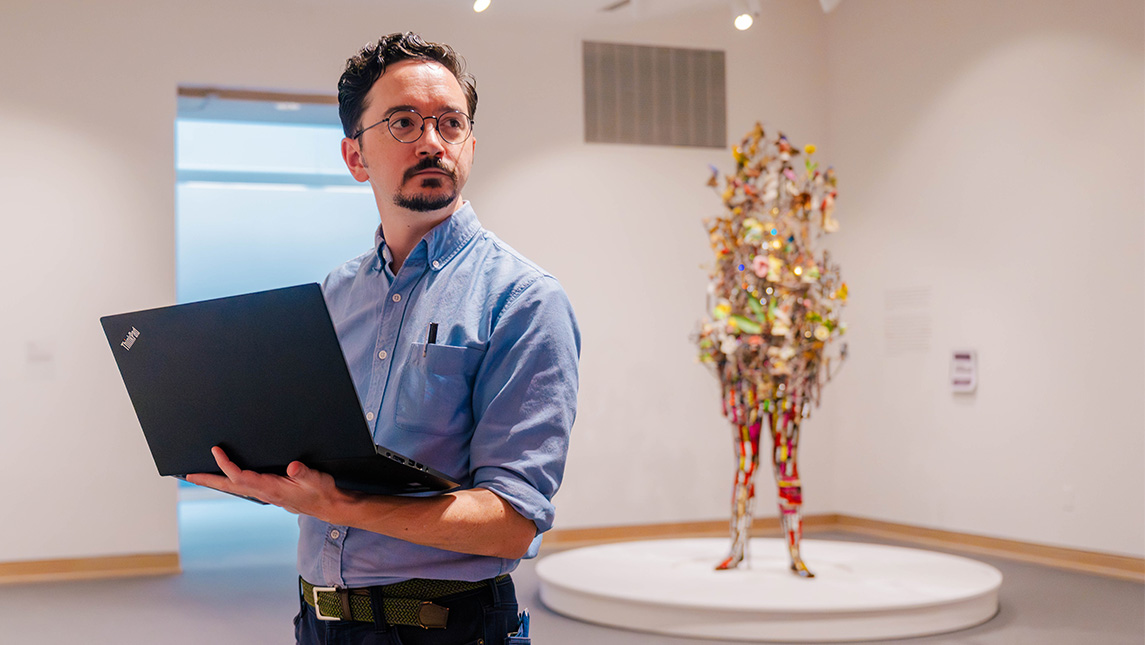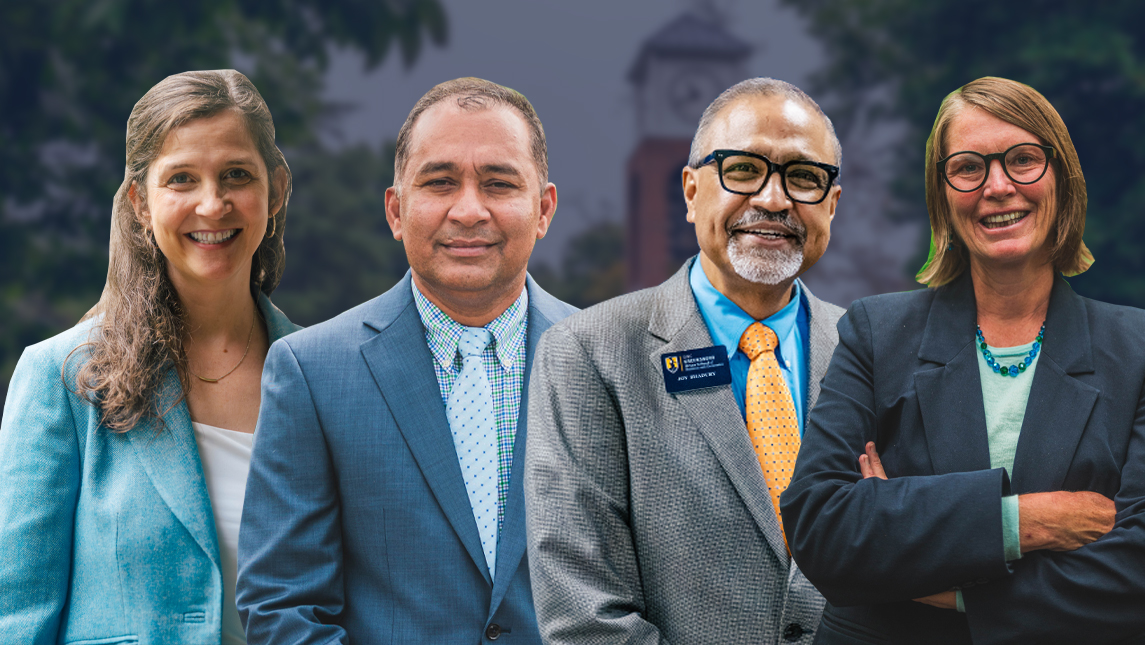HHS Asks UNCG’s Women in Science
Kimberly (Kim) Allred, Department of Nutrition
1. What is your official title with HHS?
Laboratory Manager
2. When did you start at HHS?
The fall of 2020 in a split position between HHS and the College of Arts and Sciences. In fall 2024, I moved to a position with all of my efforts in the Department of Nutrition.
3. How did you get started in your field of work?
As an undergrad at the University of Georgia, I worked part-time in a research laboratory. This was my initial exposure to conducting research. I participated in many different types of projects and started to develop a unique set of skills. Each day was a little bit different, and this created an exciting work environment.
4. Is it what you thought you would do when you were in high school?
No, in high school I wanted to be a veterinarian.
5. Explain a little bit about what you do and how you hope it will make an impact on UNCG as well as society.
I have helped collect data for multiple research projects, including ones that focus on how environmental exposures that include diet influence inflammation in the colon and risk of developing colon cancer. Findings from these studies will help medical professionals and government entities understand if these molecules pose a health risk and will eventually help shape public policy. Most recently, I have begun supporting a broader spectrum of research projects in the Department of Nutrition. The work from these laboratories has far-reaching implications on human health.
6. What has been the most rewarding part of your career thus far?
I’ve had the opportunity to work at several universities and have been able to help train graduate students in various laboratory techniques. It’s rewarding to see the students learn and grow their research skills. I have also enjoyed all the people I have met and been able to work with on different projects.
7. What has been the most challenging aspect of what you do?
Time management and keeping up with current laboratory techniques and protocols.
8. What advice would you give to women just beginning in this field?
Be organized, confident, and adaptable. Seek out opportunities to observe and learn new techniques from more senior faculty and staff. Don’t be afraid to ask questions.
Dr. Stephanie Irby Coard, Department of Human Development and Family Studies
1. What is your official title with HHS?
Human Development and Family Studies Professor
2. When did you start at HHS?
2006
3. How did you get started in your field of work?
When I was a freshman in college, I quickly became interested in psychology. I was also interested in business, because I knew it was a viable field. I decided to merge the two and gained interest in industrial/organizational psychology. I thought I would get hired by a Fortune 500 company and focus on human behavior in organizations and the workplace, and understand and improve how people work, interact, and perform within organizations. But that changed when I was offered a summer internship with the American Red Cross. It focused on early child development and working with under-resourced families of color. I was quickly intrigued by the resilience and strength of these children and families. At the end of the internship I realized I wanted to make a shift and work directly with youth and families and have a direct impact.
4. Is it what you thought you would do when you were in high school?
Not really. I was always interested in psychology, but it wasn’t until the end of summer of my freshman year that my goals were actualized. I later went on to get my master’s in human development, and my Ph.D. in counseling psychology, so I could actualize them.
5. Explain a little bit about what you do and how you hope it will make an impact on UNCG as well as society.
My research examines racial, ethnic, and cultural influences on youth development, family functioning, and the development and implementation of culturally relevant, evidence-based practices targeting African American families and communities. My clinical training and understanding of socio-cultural factors has informed my work in the research and development of culturally relevant strategies to assist African American parents to prevent and manage common behavior problems among youth and improve psychological well-being and family functioning. This funded research has resulted in the development of an observational measure of racial socialization, parenting curricula, and written materials. My work makes an impact on UNCG because Black family and mental health cannot be overstated, as it has profound implications for individuals, families, universities, and communities. My work matters because it addresses historical trauma and systemic racism; culturally relevant care; improves community well-being; and is a vital aspect of well-being.
6. What has been the most rewarding part of your career thus far?
Creating supportive spaces for individuals and families in the community and students here at UNCG. I believe my work fosters mental health. Universities and communities need to create spaces where Black individuals feel seen, heard, and validated in their experiences. These spaces can provide emotional support, connect individuals with resources, and offer guidance that is sensitive to their unique cultural needs. Also, inspiring future generations. Black women in academia serve as role models for young Black students, particularly women. This is especially significant in higher education, where mentorship and representation are key to student success and persistence. Their success provides inspiration and demonstrates that academic careers are achievable, helping to foster a sense of belonging and possibility among underrepresented students.
7. What has been the most challenging aspect of what you do?
Black women in general, but specifically faculty in academia, face a unique set of challenges that are deeply rooted in racial and gendered discrimination. These challenges have impacted my career profession, professional experiences, and personal well-being. Despite my significant contributions, I have encountered systemic barriers throughout my education, training, and professional life. These are key realities and challenges for Black women and faculty. These challenges are multifaceted and deeply ingrained in the structures and cultures of higher education and other spaces. These barriers create significant obstacles to success and well-being. Addressing these challenges requires a systemic shift in how academia values diversity, equity, and inclusion; efforts to provide mentorship; promote anti-racist policies; ensure equitable compensation and promotion practices; and foster supportive environments.
8. What advice would you give to women just beginning in this field?
Black women in the workforce must navigate the complex landscape of higher education, while challenging it is an opportunity to build a meaningful and impactful career. I recommend finding and building your support network, seeking mentorship and connection with allies, and building peer networks. Join professional associations, prioritize self-care and mental health, and set boundaries. You need to embrace your unique perspective and expertise by owning your voice and not letting imposter syndrome hold you back. Be strategic about career development. Understand and navigate the tenure process and advocate for yourself. Combat tokenism and overwork. Remember as you succeed, to reach back and mentor and empower future generations. Always stay committed to your values. Remember that you are not alone.
Dr. Aubrey Kehoe, HHS Office of Research
1. What is your official title with HHS?
Research methodologist
2. When did you start at HHS?
Nov. 7, 2024
3. How did you get started in your field of work?
When I started college, I wasn’t exactly sure what I wanted to do. I eventually decided I was going to go to medical school and become a psychiatrist. After my BA in psychology, I got into a dual MD and Master of Public Health (MPH) degree in Grenada. I spent a lot of time in the public health world before I started any of the MD classes, and when I started medicine, I realized I didn’t want to be working with people at the treatment stage of a disease. I really connected with the public health goals of prevention and community care. So I withdrew from med school and dove headfirst into the world of epidemiology and public health prevention research.
4. Is it what you thought you would do when you were in high school?
Not at all! I bounced between wanting to be a marine biologist working with whales and dolphins or being a pastry chef.
5. Explain a little bit about what you do and how you hope it will make an impact on UNCG as well as society.
I act as an internal research methods and statistical consultant for HHS faculty and students. I help with many different things, including external grant applications, study analysis, and manuscript collaboration. I am here to bounce ideas off of, when anyone is designing a study and deciding what statistical methods to use. The experiences I’ve had with mixed-methods push me to link hard quantitative numbers to the context that we get with qualitative research. The more we can help contextualize research and data, the better we can understand what we are researching, and ultimately move us forward in prevention and treatment.
6. What has been the most rewarding part of your career thus far?
I have done some great research in my LGBTQ+ community in Georgia, which let me interact with the local community on many different levels. This was extremely rewarding to give back to the community who was so accepting when I moved there. However, the most rewarding for me has been working with my peers who aren’t in the epidemiological or statistical worlds. I have been able to be that wall that they throw their goals at, and we can talk through way that a stats method could improve what they’re trying to do. And the way they get excited to see how the more “hard science” statistics can work in their qualitative interview research has made me very proud to do what I do.
7. What has been the most challenging aspect of what you do?
Working as a research methodologist or statistician who acts as a jack of all trades, I sometimes feel I must know everything right away. The hardest part of what I do is to be OK with not knowing, but finding out. I really like the process of learning. Doing it in my new role allows me to look at different solutions that might be innovative and helpful. But getting over that “I need to know it, I can’t say I don’t know,” mindset has been my biggest challenge.
8. What advice would you give to women just beginning in this field?
For women, nonbinary people, and anyone who comes from a less represented community, know that you belong in the science field. Keep that in mind every time you go through something difficult. We need you in this field. We need your perspective, your unique way that you think through problems, and your insights into the communities that you come from. Stand up for yourself, your ideas, and find your community. The things we can do when we decide to are amazing.
Dr. Rachel Mills, Genetic Counseling Program
1. What is your official title with HHS?
Genetic Counseling Program Assistant Professor
2. When did you start at HHS?
August 2019
3. How did you get started in your field of work?
I learned about genetic counseling in high school and went to college with the intention of going on to grad school and becoming a genetic counselor. After graduating from UNCG’s program in 2008, my first job was as a health educator for a research project related to the genetic risk of lung cancer. My first experience with teaching and working with genetic counseling students was shortly after graduation, when I was invited back to UNCG to give a guest lecture about working as a research genetic counselor, and then serving as a committee member for UNCG’s genetic counseling students’ Capstone projects.
4. Is it what you thought you would do when you were in high school?
Kind of! I knew in high school I wanted to be a genetic counselor, but I thought I’d be working in a clinical practice. Working as a research genetic counselor and then as a faculty member in a genetic counseling program was not quite what I envisioned but is actually a much better fit for me.
5. Explain a little bit about what you do and how you hope it will make an impact on UNCG as well as society.
My primary roles as an assistant professor are teaching and advising all our Genetic Counseling students on their Capstone projects. I hope in this role I am helping my students understand how to conduct quality research, and the importance of research in guiding our practice. By helping them develop an appreciation for research, I hope they will go into their work as practitioners whose work is shaped by critical thought. Downstream effects will hopefully include improved patient care and outcomes.
6. What has been the most rewarding part of your career thus far?
I love when students come into the program claiming they don’t like research or they’re intimidated by it, but leave with a greater appreciation for it. It’s so rewarding to see the students’ pride in themselves and their accomplishment when they present their project and submit their final manuscript. More broadly, as a member of the genetic counseling profession, it has been rewarding to be involved in professional organizations and see the growth and progress of our community and practice.
7. What has been the most challenging aspect of what you do?
I really struggle with grading assignments—it’s my least favorite part of teaching! It has been challenging to navigate working with students who have different learning styles than my own. But I appreciate this challenge, as it’s helped make me a more understanding mentor and instructor, by pushing me to develop more inclusive strategies for advising and teaching.
8. What advice would you give to women just beginning in this field?
Build a community with others who have shared interests and experiences. I have wonderful support groups from other women in my field, including my classmates from grad school, my colleagues at UNCG, other genetic counselors involved in volunteerism with our professional organizations, and a group of women who are researchers and were enrolled in a PhD program at the same time as me. We all provide different types of support and connection, so I don’t have to rely on just a few people for everything. Many of the women in these communities have served as formal or informal mentors. I’d advise that you find mentors in your communities early on. Mentors can serve in a number of roles and for a certain time period based on your needs. Mentorship can be bi-directional — I became a mentor for another genetic counselor, but I ended up learning just as much from her! So don’t be afraid to share your own experiences or insights, they are just as valuable.
Emily Postlethwait, Department of Kinesiology
1. What is your official title with HHS?
I’m a second-year master’s student majoring in Kinesiology, concentrating in Sport and Exercise Psychology. I also serve as a research and office assistant for the Department, via the Center for Women’s Health and Wellness, the Physical Activity and Lifetime Wellness Lab, and for the Middle College.
2. When did you start at HHS?
I started my degree in August 2023 and will graduate this Spring (2025).
3. How did you get started in your field of work?
During my time at Goucher College, where I completed my B.A. in Psychology, I was really drawn toward the therapy/counseling space. I also played collegiate field hockey and my coach had us attend a few sessions with a sports psychologist. It made such a huge difference in my performance, as well as my confidence on and off the field. From that moment, I realized I didn’t just want to enter a therapy space, but I wanted the chance to work specifically with athletes, performers, and exercisers. When applying to graduate schools, I wanted an opportunity to mesh both my love of learning psychology with the sport and exercise space.
4. Is it what you thought you would do when you were in high school?
Not specifically. I’ve always been drawn to a profession that “helps” others. I bounced around between nursing, physical therapy, and veterinary medicine. But they never felt right for me and required me to take way too many biology classes for my liking. However, when I took my first psychology class, I knew that was where I was meant to be. Since then, the field of psychology has driven both my professional and personal goals.
5. Explain a little bit about what you do and how you hope it will make an impact on UNCG as well as society.
As both a research and office assistant, my focus has been on adolescent girls’ and women’s physical activity and different facets of well-being. My main goal with my current research and future therapeutic practice is to address everyone holistically. With my work in the Physical Activity and Lifetime Wellness Lab, I’ve had the opportunity to examine the associations between adolescent girls’ physical activity, their social support networks, the environment they’re in, and their stress levels. This research was necessary, but using the findings from the work in the planning of events at the Center for Women’s Health and Wellness has been a tangible way to impact the Greensboro community. Similarly, with my work at the Middle College, where the lessons I observe are on self-compassion and restorative practices, I hope that through work like this, I can help bridge the research to practice gap, by focusing on repairing relationships and social connections — whether that be through school programming and lessons, physical activity and exercise spaces, or through every day actions. There’s strength in community, we just often forget to connect the people who look to see what is happening with what can happen.
6. What has been the most rewarding part of your career thus far?
My time at UNCG has marked the most significant amount of growth for me, both professionally and personally. When I started this program in 2023, I was a quiet, hard-working perfectionist. I was hit with impostor syndrome from the jump and have struggled to overcome it every day since. However, through my progression of the program, I have found my voice. I’m still that same, hard-working student, but I’ve learned to give myself grace, set boundaries, and my confidence has skyrocketed. Through my work, classes, and assistantship assignments, I have been able to gain experience in and with fields that inspire and encourage me to make a difference. It’s proven to me that I’m capable, dependable, and the type of person who deserves to take up space.
7. What has been the most challenging aspect of what you do?
My role as a graduate student is not easy. Imposter syndrome, work-life balance, always having to consider the next step — it’s a labor of love. Before UNCG, I had never been involved in research at this caliber, nor had I ever had to balance this level of research with graduate-level courses and 25+ hours of work per week. It’s been an adjustment, and on many occasions, I convinced myself that I did not deserve to be here. It was also difficult to navigate because I know this is not the terminal step of my schooling, but I also needed to remain present. Most of my time in this program has felt like a lot of unknown. Which can be terrifying, but it has also allowed me to leave the door open for so much possibility.
8. What advice would you give to women just beginning in this field?
Speak up for yourself from the start. I was always really anxious to participate in staff meetings, voice my opinions in graduate classes, set boundaries with mentors, or ask for help. I expected everyone to disagree or push what I was voicing away. But once I told people how I best received feedback, spoke up about my feelings, and used my voice in classes and meetings, I reaped the benefits of graduate school. You get out of this experience what you put in. That’s not to say you should be constantly running yourself into the ground for progress, but that you learn to adapt, are flexible, and remember what is most important through each season of life and proceed from there.
Dr. Michelle Vance, Department of Social Work
1. What is your official title with HHS?
Department of Social Work Assistant Professor
2. When did you start at HHS?
August 2024 (though was an adjunct via N.C. A&T since 2019)
3. How did you get started in your field of work?
I have been a social worker since 2001 and as I was pursuing my master’s in social work (MSW, received in 2009), I began bridging my social work practice with research. I worked as a research assistant on a project aimed to test the effectiveness of a social support intervention for formerly incarcerated individuals. This was a transformative experience that deeply shaped my professional trajectory. In engaging directly with the participants, particularly from racialized and minoritized communities, I was able to document their lived experiences with the barriers they faced in accessing services and disparities in outcomes. This sparked my commitment to better understanding systemic factors and mental health outcomes. This pushed me to pursue my Ph.D. with a focus on mental health equity and developing more inclusive and effective programs for underserved communities.
4. Is it what you thought you would do when you were in high school?
No, I thought I would be an attorney. When I began to pursue my MSW, I contemplated doing a joint MSW/JD degree.
5. Explain a little bit about what you do and how you hope it will make an impact on UNCG as well as society.
I’m a community-engaged researcher who focuses on mental health equity, centering the mental health needs of racialized and minoritized communities. I engage directly with community members, leaders, and organizations to ensure the research process is collaborative and culturally relevant, and responsive to the very real challenges they face. My research often focuses on the intersection of race and gender and other social determinants of health, recognizing these factors can compound the challenges individuals face. I hope my research will not only enrich academic scholarship but also foster deeper connections between UNCG and local, marginalized communities. By bringing lived experiences of racialized and minoritized groups into the academic space, I can help shift the focus of research to be more inclusive and representative of the populations often left out of traditional studies. Additionally, my research can help reshape curricula to reflect the mental health needs and realities of diverse communities, training future researchers and practitioners to be more culturally responsive.
6. What has been the most rewarding part of your career thus far?
Being in a community and centering community voices in my work.
7. What has been the most challenging aspect of what you do?
It is a constant challenge to push against the structural biases that have been ingrained in academic practices, while also navigating the pressures to conform to traditional frameworks that often exclude diverse ways of knowing and being. In my work, I strive to disrupt dominant narratives and methodologies that perpetuate whiteness, ensuring that the experiences, histories, and perspectives of racialized and minoritized communities are centered and valued. This process requires ongoing critical self-reflection of how whiteness influences what research is, how it should be conducted and disseminated. It is also an active effort to engage with communities in ways that are respectful, inclusive, and responsive to their unique needs.
8. What advice would you give to women just beginning in this field?
It is important for women beginning a career in research to build a supportive network to include mentors, colleagues, and allies who will be there to uplift you and encourage you. Center your voice in your work! Historically, gendered experiences have been underrepresented in social science research.
Latest UNCGNews Faculty Staff
- UNCG Launches Fist Bump Challenge to Boost Campus ConnectionsA fist bump is the universal sign of positive acknowledgement – simple and friendly, signifying, "I see you. You belong." This small gesture will be even more prominent on UNCG's campus thanks to a new pilot program, the 500 Fist Bump Challenge Coin Connection. The post UNCG Launches Fist Bump Challenge to Boost Campus Connections appeared first on UNC Greensboro.
- Historias Espartanas: Marisa González Inspires the Next GenerationMarisa González ’16, ’19 M.A. brings many perspectives to UNCG – student, alumna, instructor, and staff member. She puts all her different roles into action to make sure all students get a warm welcome and a space to thrive within their Spartan family. The post Historias Espartanas: Marisa González Inspires the Next Generation appeared first on UNC Greensboro.
- Nutrition Researcher’s Groundbreaking Discovery about Donor BreastmilkThe findings of Associate Professor Maryanne Perrin regarding the timing and nutritional content of donor milk by country could help hospitals improve care for babies born preterm. The post Nutrition Researcher’s Groundbreaking Discovery about Donor Breastmilk appeared first on UNC Greensboro.
- UNCG Researcher Tracks Where Tick Numbers are ClimbingLyme disease cases have gone up in North Carolina since the last decade. Biology Professor Gideon Wasserberg, Ph.D. just published a new surveillance study showing where the number of blacklegged ticks is growing, including areas traditionally considered low risk. The post UNCG Researcher Tracks Where Tick Numbers are Climbing appeared first on UNC Greensboro.
- Engineering New Art Experiences3D-scanning technology could transform the world of art and how it’s displayed. A UNCG faculty member is laying the groundwork for using this software responsibly to enrich the museum-going experience. The post Engineering New Art Experiences appeared first on UNC Greensboro.
- Meet the New Deans at UNCGWhere did they travel for research? What type of music is their jam? What energizes them about the college experience? Get to know the new leaders of the College of Arts and Sciences, Bryan School of Business and Economics, Joint School of Nanoscience and Nanoengineering, and Lloyd International Honors College. The post Meet the New Deans at UNCG appeared first on UNC Greensboro.







